
Related
Topics
Guests
- Ken SilversteinWashington editor of Harper’s Magazine. He also publishes a blog on political corruption in Washington, D.C. called “Washington Babylon.” His latest article in the magazine is called “The Mandarins: American Foreign Policy Brought to You by China.”
Links
President Bush is heading to China this week, where he will attend the opening ceremony of the Beijing Summer Olympics on Friday. The Games’ presence in Beijing have helped spotlight opposition to China on a number of policies, including its repression of the Tibetan independence movement, its support for the Sudanese government in Darfur and its crackdown on dissidents and civil liberties at home. In the latest issue of Harper’s Magazine, Ken Silverstein says many of the bipartisan experts who have advocated so-called “constructive engagement” with China are tied to major US multinational corporations that profit heavily from the Chinese market. [includes rush transcript]
Transcript
AMY GOODMAN: President Bush arrived in South Korea last night on the first leg of a trip to Asia that will also take him to Thailand and to China, where he’ll attend the opening ceremony of the Beijing Summer Olympics on Friday. In China, Bush will meet President Hu Jintao and other Chinese leaders. His visit to China will be the fourth of his presidency. No other US president has visited China more than once.
Bush has been criticized by a number of lawmakers and human rights groups for his decision to attend the Beijing Games. He has rebuffed calls to boycott the opening ceremonies over a number of Chinese policies, such as repression of Tibetan independence movement, its support for the Sudanese government in Darfur and its crackdown on dissidents and civil liberties at home.
In an interview with the Washington Post, Bush said, “One of the reasons I’m going is because I want to show respect to the Chinese people, and this is a proud moment for China.”
Well, in the latest issue of Harper’s Magazine, Ken Silverstein says many of the bipartisan experts who have advocated so-called “constructive engagement” with China are tied to major US multinational corporations that profit heavily from the Chinese market. Ken Silverstein joins me now from Washington, D.C.
Welcome to Democracy Now!, Ken.
KEN SILVERSTEIN: Thanks.
AMY GOODMAN: Lay out your thesis in “The Mandarins,” the title of your piece.
KEN SILVERSTEIN: Well, basically I looked at — I started looking at the campaign advisers, actually, to Barack Obama and Hillary Clinton — this was a few months ago when I started, and she was still very much part of the fight for the Democratic nomination — and John McCain. And I didn’t have a — I mean, the story ended up being a little bit different than what I had initially imagined, but what I discovered was that many of these advisers, not just advisers on China policy, in fact, although that’s what I focused on, but many of the presidential advisers to the top candidates worked for some of these international consulting firms whose whole business model is to open up doors abroad for US and other Western companies, in fact.
So, for example, in the case of China, you have a guy named Jeffrey Bader, who is at the Brookings Institution, which I think maybe we can get back to in a minute, but who also has worked for Stonebridge International, which is a big consulting firm headed by Sandy Berger, who used to be with the Clinton administration and in fact who was primarily responsible for — or one of the people primarily responsible for the big opening with China under Clinton. Remember, Clinton came into office promising that he would honor the spirit of Tiananmen Square and left having put into place permanent normal trade relations with Beijing.
But you found time and time again that the key advisers to the major presidential candidates had these economic conflicts that were never stated when they wrote op-eds or were interviewed on TV or radio. You know, they were always — or typically, they’d be identified as belonging to a think tank or simply as a former government official. Well, what about their relationship with, say, Stonebridge, where not only Jeffrey Bader, Obama’s — a big adviser for Obama, but Ken Lieberthal, who was the senior adviser to Clinton on China policy, both of them hold positions there?
Now, it’s fine if they want to, you know, acknowledge where they work and let the listener or the viewer decide if this might influence their point of view, but to put people on TV or on the radio and to simply let them appear to be an independent observer, when in fact they have a direct stake, really, and a close relationship between Washington and Beijing, and when their business model actually requires them being on reasonably good terms with Chinese government officials, and in fact, you know, generally much better than reasonably good terms, generally very warm, positive terms with Chinese officials, because they’re door openers — you cannot open doors with Chinese government officials on behalf of Western companies unless you are on good terms. I mean, if they don’t like you, if you say a lot of nasty things about Tibet or human rights or anything else, then the Chinese government officials that you need to help you in your business are not going to be there for you. So it’s an inherent conflict that’s just very, very rarely discussed.
AMY GOODMAN: The company that’s — Sandy Berger, chief adviser to President Clinton, also perhaps the foremost architect of the administration’s dramatic shift in China policy, you point out that he, before he came into the Clinton administration, was with the law firm of Hogan & Hartson, and he coordinated business lobbying for China at that law firm.
KEN SILVERSTEIN: Yeah, I mean, most of the people I’m talking about, most of these advisers, previously worked in government. Now they may be off in the business — the private sector. Some of them are going to end up going back into government, I’m quite sure of that, in either a Obama or McCain administration.
But yeah, Berger is a classic example. I mean, he started off in the private sector lobbying for permanent normal trade relations for China. This is back in the ’90s. And this — you know, I think probably many of your listeners may have forgotten, but ten years ago, fifteen years ago, the US relationship with Beijing was extremely heated. I mean, the debate about permanent normal trade relations with China was almost as heated as the debate over NAFTA. Millions and millions and millions of dollars were spent by the business community to lobby for this policy. And the Clinton administration reversed itself, completely reversed itself, and decided that it would prioritize — over human rights policy, it would prioritize commercial relationships. And that was what — that’s what happened. And Berger was one of the architects of this policy. After he left Hogan & Hartson, he joined the Clinton administration. So he basically lobbies for China in the private sector, joins the Clinton administration, where he lobbies for China, then goes to Stonebridge International, where he’s basically lobbying for China still.
And you find this pattern time and time again. There are senior government officials who, you know, had previously worked on behalf of China in one form or another, they go into government, then they retire, and they still have very, very important ties to China that benefit them financially in a very direct personal manner.
AMY GOODMAN: Can you talk, Ken Silverstein, about Alexander Haig and about Brent Scowcroft? Talk about, first, Haig.
KEN SILVERSTEIN: Well, Haig is — you know, the Chinese love Haig. I mean, there’s probably no American who they are more fond of than Al Haig. He worked with President Nixon and helped arrange the historic visit that Nixon made to China, which marked the opening. He worked with — you know, he was Secretary of State under Ronald Reagan, and he, you know, very actively promoted Chinese interest against Taiwan, which also had a very powerful lobby.
And I should say here that, you know, Haig and many of the generation of foreign policy advisers from those years, the Reagan years and the Nixon years, the Republican presidents pre-George Bush, looked upon simply — or the Cold War Republican presidents — looked upon China simply as a buffer against the Soviet Union or as an ally against the Soviet Union. They didn’t really look at China in any way other than as a geopolitical, geo-strategic vehicle for the United States. And, you know, our primary enemy was the Soviet Union, and even though China was communist, it was not close at all to the Soviet Union, and so we made an alliance with China, you know, in this grand strategic game.
So, Haig develops very close relationships with China then. Then he retires, after becoming somewhat controversial, some of your listeners may recall, when he tried to take over the US government after Ronald Reagan was shot, claiming that he was next in line for power. He made a number of blunders. Yet he then goes into the private sector, opens up a firm called Worldwide Consulting, and, from there, becomes a door opener, and he does a lot of business in China, very close to the Chinese government.
He actually went to Tiananmen on — a year after Tiananmen Square, he went to Beijing and stood in Tiananmen Square during the fortieth anniversary of the Communist Party’s rise to power in China. He was the only prominent Westerner who attended. Most of the Western ambassadors boycott. But Haig, in a show of solidarity, turns up at Tiananmen. And so, of course, the Chinese government loves Al Haig. So if you’re a company, an American company, and you want to establish a business in China or expand your business in China, of course you’re going to go to a guy like Al Haig. He can help you. So you pay Haig, and he opens the doors for you in China.
Same thing with Scowcroft. Scowcroft also worked for the Bush administration at the time of Tiananmen and, very soon after the crackdown there, traveled to Beijing and met secretly with Chinese leaders to try to make sure that there would be no serious fallout in the US-China relationship. So he is also well loved by the Chinese government. And these are the sorts of people who American companies now can turn to and say, “Look, we need your help.” And they get it, because the Chinese government is very fond of these former officials.
AMY GOODMAN: You give the example of Brent Scowcroft taking the former CEO of Qualcomm, Irwin Jacobs, for a meeting with China’s prime minister.
KEN SILVERSTEIN: Yeah, he traveled over to China with several prominent Fortune 500 CEOs, including the CEO of Qualcomm and also of Chubb Corporation, as I recall. And, you know, this is what we know, because the fact is that these companies do not disclose their clients. It’s very difficult to find out who they’re actually working for. They’re under no — it’s actually, in some ways, more nefarious than lobbying, I think, because if you’re a registered lobbyist, then at least the American public knows who you represent, and if you go on TV, people can at least say, “Oh, he’s a former — he was a lobbyist for such-and-such government or such-and-such corporation.” But the people at these big economic consulting firms, like Stonebridge — or Scowcroft has his own firm, and Haig has his own firm — I mean, there are dozens and dozens of these consulting firms across Washington — and they don’t disclose who they work for, they don’t have to disclose their clients, and so, you know, the public has really no way of knowing who they represent when they make their media appearances.
AMY GOODMAN: Scowcroft’s relation with McCain?
KEN SILVERSTEIN: McCain said there’s no one in the world he respects more than Brent Scowcroft. I mean, Haig and Scowcroft are informal advisers to John McCain. They are not formally listed, but they are both close to McCain, and as I said, McCain said that there’s no one he respects more than Scowcroft. So he has very — you know, I can assure you that if McCain is elected president, he will be getting advice on China from Scowcroft.
AMY GOODMAN: Scowcroft’s firm, the Scowcroft Group, does employ a few Democrats, you mention, including Kevin Nealer, a former State Department official and trade adviser to Senate Democrats. What is his significance in the relationship with China?
KEN SILVERSTEIN: Well, first, let me just quickly say that all of these firms tend to be bipartisan. They may — you know, Stonebridge has a preponderance of Democrats. But they always want people from the other side, because that way they can reach out to companies that may feel more comfortable with — you know, politically with a Republican, as opposed to a Democrat. So they are all bipartisan.
Nealer was a State Department official who had worked on China, who, at the Scowcroft Group, is the primary contact, I guess, for a major investment fund that has extensive holdings in China. And he also, like many of these guys, served on — he produced a Council on Foreign Relations study that proposed closer relationships with China. This is another thing that’s very interesting. If you look at the authors of virtually any major think tank report on foreign policy and you look down the list of who put it together, you’re almost always going to find people from these consulting firms. And again, at least let’s identify these people. I mean, you’ll see them identified as belonging to a think tank, say, but what you won’t see is, you know, a guy like Nealer identified as working for the Scowcroft Group. I mean, let’s get these conflicts out in the open, at least, so the public knows who’s putting together our foreign policy.
AMY GOODMAN: Now, both Obama adviser, Bader, and McCain’s most respected, Scowcroft, both of them deny that the advisory class has in any way compromised by its business relationships with China.
KEN SILVERSTEIN: Well, I mean, you would expect them to deny it. I mean, but really, frankly, it defies all logic. I mean, let me be honest with you. I work for Harper’s Magazine
. If you were to put me on a — I mean, that’s where I get my paycheck. I’m the Washington editor of the magazine. If you put me on a panel about the greatest magazines in America, it’s very likely that I might point to Harper’s or at least put us in the top two or three. It’s hard, when you’re getting paid by an institution or where you have financial ties, direct financial ties, to, in this case, a country, not to have your judgment and your point of view at least somewhat clouded.
I also talked to Perry Link, a Princeton professor, who said that, you know, there’s no doubt that these people who work for these consulting firms in — you know, he says, within the academy, within the think tank world, it’s very well known that people who have such ties are in some ways biased, at minimum. And Link has said that — he told me that, you know, he’s actually banned from entering China, because he had written some very critical pieces and done some critical work, and the Chinese actually banned him from going over there. And he said to me, “Look, I” — he founded Princeton’s summer program in China some years ago, and then he was barred from going over there. And he said, “Look, it, you know, was painful. You know, I’d love to go over to visit my friends in China, and it’s a great position to head the summer program. You get paid very well. It’s a terrific position.” He said, “You know, I have to admit, if I hadn’t been barred from entering the country, I might find myself hedging my own opinions about China, just so as not to anger the Chinese government.”
And he said he constantly came across graduate students who were shying away from topics, such as human rights or forced abortion or issues that might anger the Chinese government, because they knew it would make it more difficult for them to further their academic research in China, and it also might have some career implications.
So I think it’s illogical. You know, I would expect the advisers to say, “No, of course it doesn’t influence us.” And I would also say that I don’t believe it’s as simple as, well, they open doors in China, and hence every word they say has no value, because some of these people are extremely smart and insightful. And yet, there’s no question that their point of view has been — is not impartial. I mean, at a minimum, if they’re not in any way influenced by this, then why is it that so few of them identify these ties? I mean, you never see Jeffrey Bader, when he goes — writes an op-ed or when he’s on the radio — why don’t they volunteer, “Oh, and, by the way, it’s irrelevant that I work for Stonebridge. People ought to know that.” And I found, time and time again, that these advisers — it seems to me that they actively try not to disclose a relationship that might be somewhat embarrassing. And there’s a good reason: it is embarrassing.
AMY GOODMAN: How do they actively try to disclose — prevent the disclosure?
KEN SILVERSTEIN: Well, I know that when I first talked to Brookings, I contacted Bader through the Brookings Institute, which receives an enormous amount of money from John Thornton, who is a former CEO of Goldman Sachs and himself has a lot of direct financial stakes in China — he’s the primary funder of the China program at Brookings, which is named after him, so that’s another story. But I contacted Brookings, and I contacted the Obama campaign, and when I talked to Brookings, I mentioned — you know, I was told by someone at Brookings that “We prefer not to have the Stonebridge label disclosed.” Now, they might say, “Well, it’s because, you know, we’re Brookings, and we want more credit for Brookings,” but it seemed to me that it was quite clear that they preferred not to mention Stonebridge in talking about Bader.
And if you just — if you simply look — I mean, look, look at how these people are identified. I looked at dozens and dozens and dozens of media appearances for people like Bader and Scowcroft and Ken Lieberthal. You almost never come across an instance where they list their affiliation with — you know, if they’re talking about China, don’t you think that working for Stonebridge, which has offices in China —- and, in fact, Lieberthal and Bader are both listed as being key officials at Stonebridge China. That would be a little bit relevant, I would think, to their identity when they appear in the press. But it never comes out, and I can’t help but believe, from what I heard and from what I see, in terms of how they’re identified in their media appearances, that that’s not deliberate. It raises questions about the independence of their point of view, and I’m sure that they wouldn’t want that done.
AMY GOODMAN: Ken, you close with a telling quote from the Princeton University professor now banned from China, Perry Link, who said, “I’m for engagement. When people like Henry Kissinger talk about engagement, they mean black tie affairs with top government and business leaders. But those leaders are not the same as the Chinese people.” Ken Silverstein, thanks so much for joining us, Washington -—
KEN SILVERSTEIN: Thank you.
AMY GOODMAN: Washington editor of Harper’s Magazine. We’ll link to Harper’s on our website. He also publishes a blog on political corruption in Washington, D.C. called “Washington Babylon.”


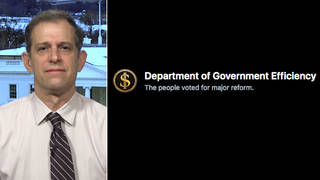
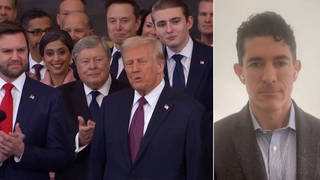
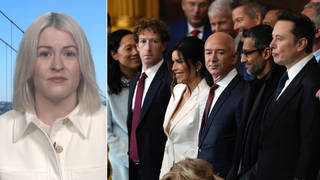





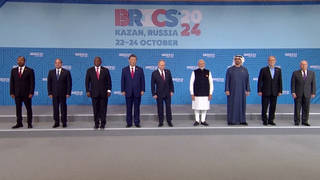
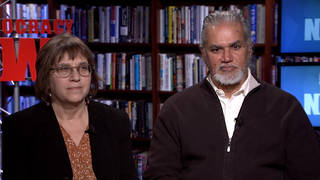
Media Options